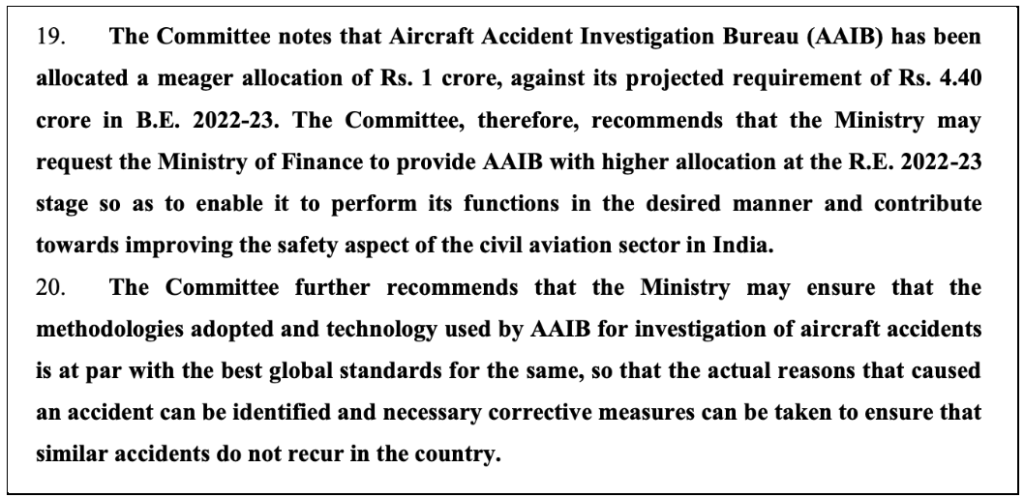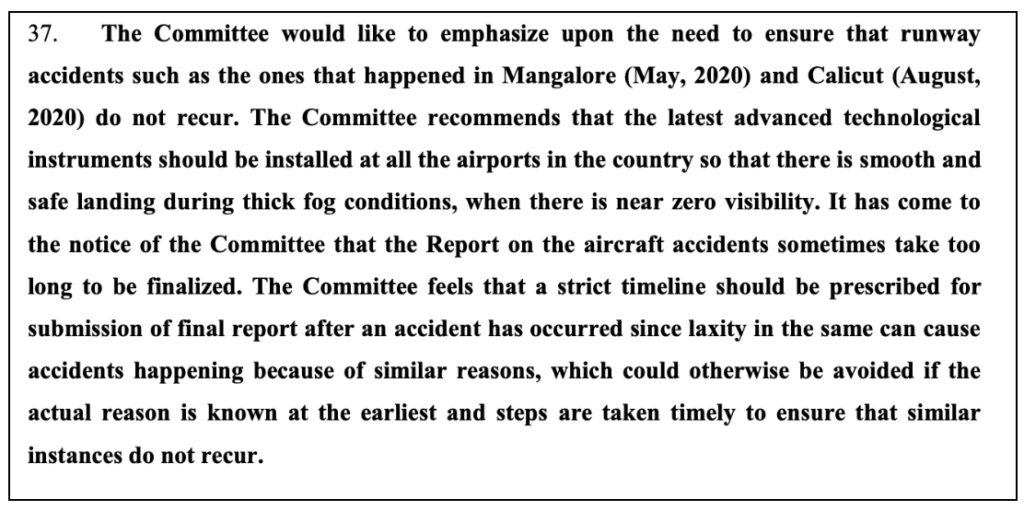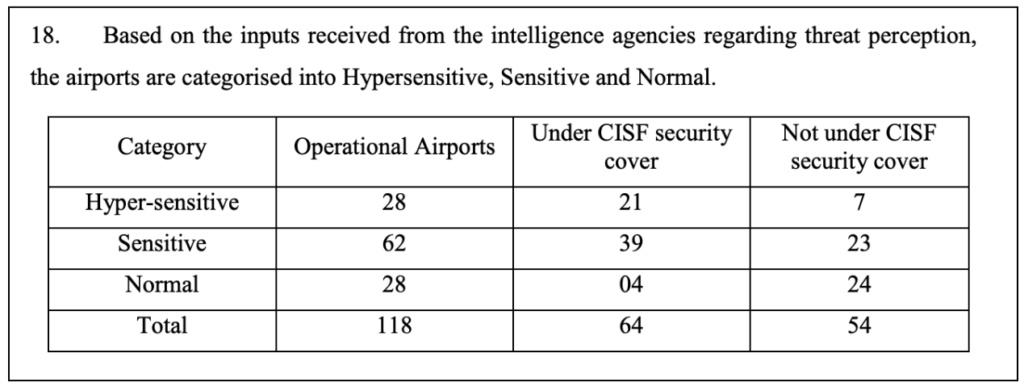The Department-related Parliamentary Standing Committee on Transport, Tourism, and Culture presented reports on safety & security in the aviation sector in the recently concluded 2022 Budget Session. The committee highlighted multiple aspects related to safety & security including vacancies of personnel and made relevant recommendations.
The Department related Parliamentary Standing Committee on Transport, Tourism, and Culture presented reports on ‘Issues related to Safety in Civil Aviation Sector’ and ‘Issues related to Security in Civil Aviation Sector’, in the 2022 Budget Session as passenger traffic grew significantly in the last few years barring the period affected by the COVID-19 pandemic. Between 2018-19 and 2021-22 (up to February 2022), over 965.59 million passengers were handled by all public and private airlines in the country. In 2018-19 alone, 344.7 million passengers were handled by airlines in India. As air travel expands in India with increasing passenger traffic from newer places, safety and security at airports, airlines, etc. becomes paramount. These issues have been addressed in the standing committee reports. The issue of safety as discussed by the committee has been dealt with in the first part of the story which is followed by security concerns in the sector.
Safety issues and recommendations
DGCA was asked to coordinate with AAI and Airline operators to ensure the implementation of safety guidelines
The role of the Directorate General of Civil Aviation (DGCA) is the overall management and supervision of the entire gamut of activities related to the safety aspects of the aviation sector like licensing and surveillance of airlines and aerodromes, licensing of the crew, implementation of Safety Management System, investigation of incidents and surveillance of aircraft operations in the country. Noting the pivotal role of DGCA in ensuring safety in civil aviation, the committee recommended that DGCA coordinate regularly with the Airports Authority of India (AAI), airport, and airline operators to ensure that its guidelines are implemented. It is also recommended that modern technology be used to prevent accidents. The Ministry of Civil Aviation was asked to review the safety mechanisms in place and ensure that DGCA has no budget or human resource constraints.
The Aircraft Accident Investigation Bureau (AAIB) which was established in 2012 as an independent organization from DGCA, for the investigation of Accidents and Serious Incidents was allotted only Rs.1 crore against the projected requirement of Rs. 4.4 crores in 2022-23. The committee recommended higher allocation at the Revised Estimates (RE) stage.

Fill vacancies in ATCs to keep pace with future requirements says the Committee
Noting the critical role of Airport Traffic Controllers (ATCs) to ensure safe operations of aircrafts, the committee pointed out the backlog in filling vacancies of ATCs. It recommended that the procedural issues in recruiting for ATCs be addressed to keep pace with the increasing requirement in the future.
With respect to the airworthiness of aircraft engines, the committee observed that the safety and maintenance regulations should be strictly complied with, and heavy fines should be imposed on airline operators who violate the regulations.
Citing the accidents that took place in Mangalore and Kozhikode airports in 2020, the committee suggested that the latest technological instruments be installed at all airports at the earliest to ensure smooth and safe landings even during thick fog conditions, and when visibility is zero. Installation of Instrument Landing Systems (ILS) at all functional airports was also recommended to be done at the earliest for safe landing of aircrafts at night or in bad weather conditions. The committee also recommended that a strict timeline be framed for the submission of reports on aircraft accidents that would otherwise be delayed.

Issues related to drones, helicopters, and bird hits were also raised
While appreciating the Ministry’s introduction of liberalized Drone Rules, 2021, the committee asked the Ministry to come up with policy provisions to promote the local manufacture of drones in the country. Furthermore, it noted that the Rules empower the Central Government to notify safety features to be installed on drones by persons owning them and asked the Ministry to do so at the earliest since drones have the potential to be misused.
Stating that helicopter accidents have also claimed lives, the committee asked for details of such accidents in the last few years. It added that the safety of helicopter operations should also be given importance and recommended that the ministry formulate guidelines for safe operations of helicopters even in bad weather conditions and strengthen the provisions for ensuring safety and airworthiness for helicopters, like in the case of aircrafts.
Periodical aviation safety and security audits are carried out by International Civil Aviation Organization (ICAO) and Federal Aviation Administration (FAA) in the country. The committee recommended that the Ministry should pay cognizance to the findings and ensure that they are addressed on a priority basis. Internal audits on a regular basis to keep track of the progress made in this aspect were also suggested.
The Committee also noted the incidents of bird hits in many parts of India and asked the Ministry to take remedial measures to be taken at all airports to reduce such incidents. It added that the Ministry may reissue the guidelines for compliance by the appropriate authorities.
Security issues and recommendations
CISF, Airlines Operators, Airport Operators, State Police and NSG are the various agencies involved in providing security at airports. The government has envisaged expanding airport capacity in the country to handle one billion trips a year by 2022-23 when India would celebrate its 75 years of independence. If the capacity is increased to about five times the current capacity, the government should also strengthen the security infrastructure and manpower in the sector accordingly, as per the committee.
CISF should cover all airports and ensure vacancies are filled
The committee noted that CISF cover was extended to only 64 out of 118 operational airports and asked the government to bring all operational airports under the ambit of CISF. Only 75% of airports in the hypersensitive category were under CISF.

The committee also observed that there was a vacancy of 1,166 CISF security personnel at airports and recommended that full sanctioned strength of CISF should be provided at airports. Further, it added that periodic surveys be conducted to keep track of the changing threat perception at all airports and impart training to the security personnel accordingly. It also suggested conducting surprise checks to test the alertness and efficiency of security staff.
It was noted that 44 airports were not covered by Bomb Detection and Disposal Squad (BDDS) and the committee called for engaging BDDS in these airports at the earliest after consulting the Home Ministry. It also added that the BDDS squad has the best international pedigree dogs for security.
Soft skill training for security personnel & State-of-the-art technology for security check
Security personnel is the first point of contact for airline passengers, including foreign passengers after disembarking from an aircraft because of which security personnel end up setting the impression of a city or country. On these grounds, the committee emphasized the need for giving training to the personnel on soft skills including body language, behaviour, and dressing. Special care for persons with special needs based on an SOP was also recommended.
Door Frame Metal Detectors and Handheld Metal Detectors which are used in most airports were observed to be intrusive to passenger privacy, noted the committee. It recommended the installation of ‘Full Body Scanners’ at airports which would address this, as well as ensure faster clearance of queues at security checks. Additionally, the committee recommended introducing global best practices for biometric screening of passengers such as facial recognition, fingerprint, and retinal scan. Radiological Detection Equipment to detect the presence of radioactive material which can be lethal should be installed in the stipulated time, stated the committee.
Even the 28 hypersensitive airports lack state-of-the-art security equipment to ensure foolproof security noting that the committee recommended the installation of such equipment across all hypersensitive and then sensitive airports at the earliest.
The Bureau of Civil Aviation Security (BCAS) under the Civil Aviation Ministry has set standards for security equipment which should be adhered to by the airline operators. The committee also recommended that BCAS be involved in imparting training to personnel on handling the equipment.
Featured Image: Safety issues at airports


